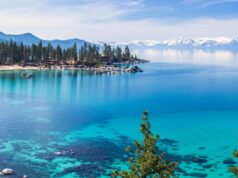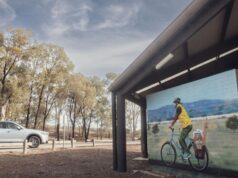
Published in Great Ocean Quarterly magazine, October 2014
I was 20 years old and three hundred dollars had bought me a trip round New Zealand. The money changed hands at the Wellington Airport short-term car parking. This was before ‘Wellywood’ happened. Before Peter Jackson got his garish mits on the city; before it had become overrun by people with the mentality of toddlers; when all we had to be embarrassed about were the politicians and an excruciating emerging fixation with ‘cafe culture.’ I got a tip that some friends of my mum were driving to the airport that day; bailing out for good. They saved themselves from ever having to wake up to a giant Gollum menacing the grand old Embassy Theatre (toddlers)! These clued-up emigrants were trailblazers. Like a vulture, I was picking over their remains.
A 1987 white Mazda 323 wagon. The salty Wellington air had done a good job of rusting away sections of the roof, and most of the doors. Various dings, indents, chips and scratches graced the body. One hub cap. It looked like the car you drive on Daytona 500 after you’ve crashed into 37 other cars before the end of the first lap. I probably could have talked them down to two hundred.
The car had three months legal life on it before the warrant was due. I realised I would have to get as much use out of it before I became one of those people who accumulate fines for a living.I quit my job and drove around the South Island for a month. The Mazda was terrific, and the South Island wasn’t so bad, either. I was in love. I knew every quirk of that beautiful car intimately. On returning home I promptly rallied myself into completing what I started – I hit the North Island. I had become hypnotised by the silence of the south, the absence of life. I wanted to find the same sense of isolation in the North Island, so I drove as far from the action as possible, to East Cape: I drove, inevitably, to Tolaga Bay.
The checklist: isolated, gorgeous, a wide beach, craggy headlands, estuaries, cheap ice cream. But then something the South Island doesn’t have – a population almost entirely of Maori. In January a rabble of whities descend on the campground and beach, flinging frisbies and opening bottles of Gisborne Chardonnay. My Mazda and I rolled in one sticky afternoon in late March – they had cleared out. It was empty, languid, perfect.
‘Just choose a spot,’ said the bloke at the campground. I should bloody-well think so – there wasn’t another tent anywhere. I chose one by the beach, where I could look over the disheveled wharf. That wharf! Longest in New Zealand, home to a thriving barnacle population, a relic, a danger to public health, absurd, magnificent, very long. It opened in 1929 – when the best access to the town was by sea – shooting out through the breakers in search of deeper water where the ships could berth. The town threw a big opening-day party. One guy celebrated by falling under a train on the wharf and getting killed. But then, so much about Tolaga Bay is about falling (the population, employment, ambition) or jumping (kids from the wharf, the bridge) or dangling (fishing lines, anywhere). It’s a place suited to the lone-traveller, and this loner mooched his city toes through the sand without delay – a wannabe beachcomber getting the lay of the land. The land abruptly ended as my toes hit the edge of the estuary, cutting the beach in half as is shuffled out to sea. A beach river; a dead-end. Or something else.
There were voices from the other side. ‘Oi, guy! Heyyy!’ Maori kids, about ten or twelve years-old, were splashing in the shallows and had noticed me. They wore only board-shorts, which looked comically baggy, hanging low over their skinny legs. ‘Swim over!’ one of them yelled out, and his friends all laughed. It was 50 metres to the other side, across the murky tidal river. I decided to surprise them. ‘Sure,’ I called back, and began stripping down. The kids laughed even more as I plunged in and made clumsy strokes towards them. They met me half way, swimming effortlessly. ‘Come up the river with us,’ one of the boys said. His name was Wiremu and he was a couple of years older than the other kids, podgy, with a crew-cut. We swam to shallower water and then lurched though the sand and water until we were walking on spongy, wet, black mud in the river-mouth. The boys chattered mindlessly to me. I was a novelty in their lazy afternoon. How old was I? Where was I from? Did I have a car? Really? Can we see it? (‘Maybe later…’) Then: ‘Hey, watch my skids,’ called one of the younger ones, before taking a run-up and launching himself down at the mud, skidding along on his belly, arms pointing backwards: a brown seal imitating a torpedo. The others followed his lead, and of course so did I. I immediately wished I hadn’t. Embedded in the mud were hundreds of broken sea-shells, with grated along my front as I speed along, leaving painful welts. It didn’t seem to affect the kids. The skylarking continued. ‘Check this out!’ called one of the kids from atop a sand dune, before taking a leap, then pulling his shorts down in midair and landing in a wet heap in the water, shorts around his ankles. ‘Me too! Me too!’ shouted the rest, as they raced up to join in.
‘Check out my diddle,’ called one of the boys as he fell. Another said, ‘Hey, guy, do you have pubes? My brother has pubes.’ More laughter. Wiremu didn’t join in though. He was quieter than the others and less taken in by their tomfoolery. Also, he had more questions. He stood next to me and asked, ‘Can you go get your car and drive it over here?’
‘Why?’ I asked.
‘Dunno. Maybe we can all go for a ride, aye?’
I was in that mood where I could be talked into almost anything. Twenty minutes later I was back, parked on a small road near the river. The kids bounded up and laughed at my car. ‘It looks just like my mum’s car,’ said one.
‘Shuddup, your mum doesn’t even have a car.’
‘Nah, but she used to.’
Wiremu then asked the question I was secretly expecting: ‘Can I drive it? Just for a bit?’
The others chimed in. ‘Yeah, yeah! Let him drive. Go on!’
Why I let Wiremu drive my car I will never know. But after my feeble protests were quickly overcome I found myself sitting in the front passenger seat of my car, watching Wiremu grip the steering wheel, with his three mates jittery with excitement in the back.
‘Are you sure you know how to drive?’ I asked.
‘Yep,’ said Wiremu, without further comment.
‘He doesn’t!’ came a voice from the backseat. ‘Wiremu always tells lies!’
This was a call to action for Wiremu. He suddenly released the handbrake and the clutch simultaneously, and the car roared to life and jerked forward, like a horse struck with a burning poker. Thankfully Wiremu’s steering wasn’t too shit hot, and he veered commendably off into a ditch where the car stuck fast and stalled. I was in shock; Wiremu was amused and the backseat passengers were pissing themselves with laughter. I feared the car was dead, but I managed somehow to coax it out of the ditch. After regaining composure I gave Wiremu a more measured driving lesson. So, under stern instructions, Wiremu, 13, negotiated my car slowly through the empty, scruffy streets of Tolaga Bay. He pulled over near the shops and his mates spilled out. ‘Gotta dollar for some chocolate?’ one said.
‘Nah; you owe me anyway,’ came the reply. Wiremu asked me if I wanted to go to the cemetery to see his uncle’s grave. ‘Ok,’ I said. ‘But I’ll drive.’
We drove out of town a few kilometres, past decrepit weatherboard houses, a few cows, a rusty tractor, knee-high grass. ‘I’ve never been to Wellington,’ said Wiremu.
‘Do you think you ever will?’ I asked.
‘Yep. I’m gonna be a truck driver, like my uncle. Then I’ll go there.’ He thought for a moment and said, ‘Is there much crime in Wellington?’
I wasn’t sure how to answer this. ‘Um, not really, I guess.’
He fiddled with his seatbelt and looked out the window. ‘I don’t think I’d like it in Wellington.’
The cemetery was overgrown and crumbling, but peaceful and silent. It was the warmest evening of my trip. The two of us stood in our board-shorts and looked at a certain grave. There was no inscription, just a mound of dirt and some flowers – wild flowers.
‘He was a truck driver – I told you that, aye? He went over to Australia, over to Perth…you know Perth? He was driving his truck and he got a flat tyre and pulled over to change the tyre, and when he was changing the tyre a car ran him over and he died.’
‘That’s sad.’ I said. But Wiremu didn’t seem upset. He told the story calmly and then said: ‘When I’m 16 I’ll get my car licence and then I can get my truck licence and then I can buy a truck. Probably have to move to Auckland. Or Wellington.’
Back in town we caught up with the others at the road-bridge. The current activity was jumping off the bridge into the river below. I didn’t really want to but of course I did. ‘What else do you do around here, besides jump off the bridge?’ I asked. He thought for a second and replied, ‘Sometimes we jump off the wharf.’ It seemed a fair enough answer. ‘Hey,’ he said, continuing. ‘Maybe tomorrow we can go to the wharf and I’ll show you how.’
‘Sure,’ I said. I was intending to stick round another day or two anyway. ‘But don’t wag school. I’ll pick you up from school if you like. In my car.’
Wiremu grinned. ‘Oh really? That would be sweet! School finishes at three, ok?’
‘No worries,’ I said. ‘See you then.’
As I walked off Wiremu called again. ‘Hey, guy…I mean, Ricky.’
‘Yeah?’
‘You’re the nicest tourist I ever met.’ He really said that. He may have even really meant it.
Next morning there was a gentle drizzle. Behind me the wharf was a motionless as ever, impervious to the jostling of the waves, given up to the barnacles and lassoed by the seaweed. I saw it now: it was making a run for the Pacific Ocean.
I had troubles of my own. The Mazda wouldn’t start. The constant stalling and mistreatment of the day before had taken its toll. It was nothing more than a flat battery, but it took me a good hour to locate someone with jumper-leads. It put me in a bad mood. A mood to leave. I was used to packing up and going. I suddenly saw no reason to hang around. I had to drive the car now for the battery to recharge. I had to break a promise.
So I drove out of town. I wouldn’t meet Wiremu at his school gates at 3 o’clock. He was probably bragging to his friends about the tourist who had a car who was picking him up after school to go wharf-jumping. He would wait and I wouldn’t show up. His friends would laugh and call him a liar. You’re the nicest tourist I ever met.
I’m sorry, Wiremu. Thank you for taking me mud-sliding and bridge-jumping and for crashing my car and for showing me your uncle’s grave. You were a top tour-guide. And Tolaga Bay was a great host. 300 creaking houses. Average income, $15,000. Hot, inert, silent and salty, lazy, wallowing in the shallows. Wannabe beachcomber heaven. Brown faces walking along the road, dope in the hills, a model of dull contentment. Best to leave it undisturbed: its back hunched to the rest of the country; and with its wharf – simply a boney, arthritic finger in the Pacific Ocean.


